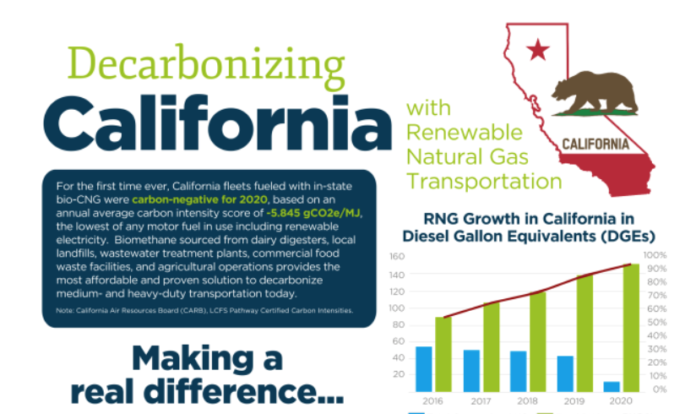Natural Gas Vehicles for America (NGVAmerica) and the Coalition for Renewable Natural Gas (RNG Coalition) say California fleets fueled with bio-CNG achieved carbon negativity for calendar year 2020.
Ninety-two percent of all on-road fuel used in natural gas vehicles in California last year was renewable natural gas (RNG). According to data from the California Air Resources Board (CARB), the annual average carbon intensity score of bio-CNG in that mix was -5.845 gCO2e/MJ. Moreover, the carbon intensity of California’s bio-CNG continues to drop. Data from Q4 2020 puts the carbon intensity average of bio-CNG at -26.11 gCO2e/MJ, down from -0.85 in Q2 and -17.95 in Q3.
“For the first time ever, California fleets fueled with bio-CNG achieved carbon-negativity in their 2020 transportation operations,” says Dan Gage, president of NGVAmerica. “This verified data means their trucks and buses leave a zero-carbon footprint while virtually eliminating criteria pollutant emissions that contribute to asthma, heart disease and poor air quality.”
In addition to their negative greenhouse gas (GHG) emissions, ultra-low NOx medium- and heavy-duty RNG-fueled trucks and buses perform at levels that are 95% below the federal nitrogen oxide (NOx) standard and 98% below the federal particulate matter (PM 2.5) standard.
Captured above ground from organic material in agricultural, wastewater, landfill or food waste, RNG can produce carbon-negative results when fueling on-road vehicles like short- and long-haul trucks, transit buses, and refuse and recycling collection vehicles.
RNG use as a transportation fuel in California grew 177% over the last five years. NGVAmerica and RNG Coalition report that in 2020 a total of 164.8 million gallons (DGE) of natural gas were used as motor fuel in the state. Of that, 152.4 million gallons (DGE) were from renewable sources.
President Joe Biden has set aggressive decarbonization goals over the next decade. That target of a 50% to 52% reduction in GHG emissions by 2030 can be achieved by deploying more cost-effective carbon-negative solutions like RNG trucks that are commercially available now, accruing and compounding significant clean air and carbon reductions today.
Details of the recent report – including graphics – can be accessed here.







